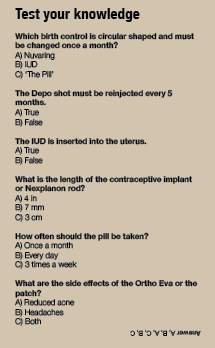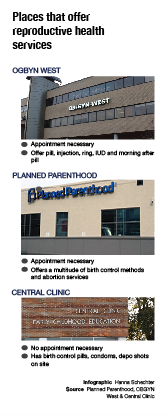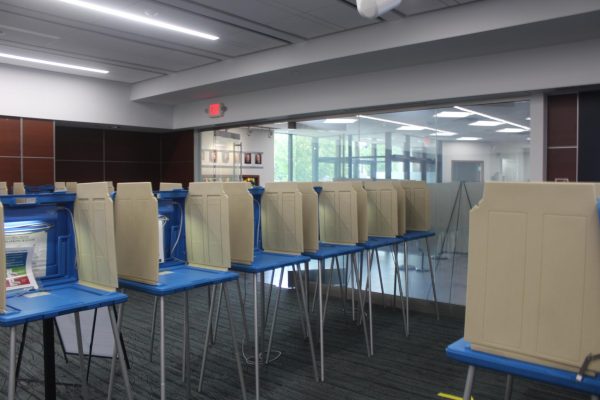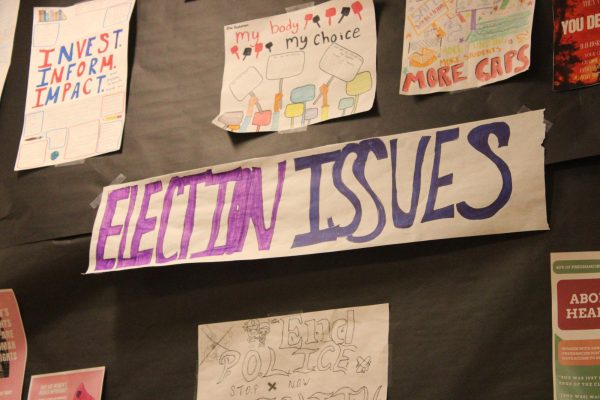Concerns arise over possible birth control legislature
Availability of reproductive health resources threatened
According to senior Khyla Bonine, changes to the Affordable Care Act may inhibit her ability to receive birth control.
“I get (birth control) through that state aid insurance so I’m in a low income household. I might not be able to get it anymore at all,” Bonine said. “I might have to pay a ton of money every month just to get it, just to be protected.”
Minnesota Sen. of District 46 Ron Latz said changes to the Affordable Care Act will give employers more liberty to deny coverage for reproductive health services.
“The efforts to allow employers that at least have religious objections to be able to refuse to provide abortion services in connection with reproductive health as a part of their healthcare coverage,” Latz said. “There’s a legal, judicial decision involved in that and the Trump administration has reversed the federal government’s position in that legal case as well.”
According to Bigos, President Trump would like to allow more businesses to opt out of covering birth control for their employees.
“He’s trying to open up the exemptions to allow more religiously affiliated groups to then claim that they are exempt from providing contraception care for patients,” Bigos said.
Pieper-Bercham said because many women are on the pill for various reasons outside of pregnancy prevention she thinks it is unfair the Trump administration would withhold insurance for birth control.
“Some people are on the pill for other reasons other than preventing pregnancy, and to deny somebody medication that’s going to help them feel better, when in essence it could have nothing to do with pregnancy prevention, I don’t think is fair,” Pieper-Bercham said.
According to Sen. Latz, the effect of these policy changes could increase the amount of young adults who won’t have access to healthcare.
“The bigger problem is that some of these proposed changes will actually go through and restrict access,” Latz said. “We will have a lot more uninsured young adults who will have less access to healthcare. As a direct result, you may well end up with more unwanted pregnancies and probably an increase in the abortion rate as a result of that.”
Junior Nyah Johnson said she thinks using any form of birth control is a woman’s choice and should not be decided by the government.
“I think it should be a choice whether a woman should get (birth control) or not. I don’t think it should be illegal or that every woman should have one,” Johnson said. “If a woman think she needs an IUD or if she wants to be on birth control, it’s her choice and she should be able to.”
Sexual Health Education Club (SHEC) president senior Philip Djerf said there are many options for students to receive affordable healthcare.
“There is Central Clinic which is a block away from (the high school) and (students) can get a pass from a teacher to go during the school day,” Djerf said. “I don’t want students to think that they have to go to a store to buy something because there’s affordable options right down the street from us.”
According to Pieper-Bercham, the health curriculum at Park teaches students about contraceptives during their junior year.
“Our junior year, one of the weeks of health we spend the week talking about the different types of birth control, the options people have and the effectiveness of the birth control methods,” Pieper-Bercham said. “(We talk about) just really pros and cons and anything you would want to know and also of the family planning method.”
Bonifas said Central Clinic in St. Louis Park provides many services that both male and female students can take advantage of.
“We will provide condoms, we have pills and we have the Depo shot. We can refer people to places to get IUDs or Nexplanons,” Bonifas said. “We offer screenings for sexually transmitted infections as well. There is a urine test or as a self swab.”
Bigos said OBGYN West provides support services to patients regarding birth control options.
“We provide all of the birth control services that are available,” Bigos said. “We are happy to counsel patients on any options from abstinence, which is one end of the spectrum, to permanent sterilization which is the other end of the spectrum.”
Bonine said she feels comfortable talking about the issue because other students have similar experiences as her.
“I feel like a lot more people are more open about (birth control) and talking about it,” Bonine said. “I feel like it’s something that everyone does and everyone goes through and it’s a private thing but everyone goes through it so it’s kind of easier to talk about it with people who are in the same situation.”

According to Johnson, SHEC is another resource for students to go to if they have questions about birth control or sexual health in general.
“I think we have a really good health program with (clubs) like SHEC. I think it’s cool that we have that and that we have students who are like ‘if you need this we can get it for you,’” Johnson said. “They are really helpful in making sure you have safe sex and that you
have birth control and IUDs and I think that’s super cool because not a lot of schools have stuff like this.”
Birth control ranges from the abstinence method to permanent sterilization and everything in between, said OBGYN West doctor Matthew Bigos.
“Birth control works in many different ways and it all depends on which type you are looking at and how it prevents pregnancy. All types of birth control prevent conception,” Bigos said.
According to Bigos, one effective type of birth control is the intrauterine device (IUD) a contraceptive device inserted into the uterus. Bigos said the devices are not permanent, but they are long-lasting.
“An IUD is a contraceptive device that falls into the category that we call long-acting reversible contraceptives, and we make that an acronym and call them LARC,” Bigos said. “LARCs are very good for use for women in their reproductive years beca

use it is a way for women to use a form of birth control that is exceptionally reliable and is easy to maintain for a long time.”
According to Park Nicollet doctor Amy Bonifas, there are two common types of IUDs.
“There is a hormonal (IUD) and there is a non-hormonal (IUD) that contains copper. The hormonal one works by thickening your cervical mucus so sperm can’t get through into the uterus,” Bonifas said. “The copper one works mostly by releasing copper ions, which do make the uterus unfriendly to a pregnancy.”
Health teacher Amy Pieper-Bercham said apart from IUDs, many women choose to take birth control pills not only for contraception, but also for other reproductive health reasons.
“The pill is really common, and a lot of people are on the pill not just for birth control but for cramps and other symptoms of menstruation,” Pieper-Bercham said. “The pill and condoms are the most commonly used forms (of birth control).”
Senior Khyla Bonine said she takes the birth control pill ‘Nikki’ as a contraceptive, as well as to regulate her period.
“(I use birth control) so I don’t get pregnant, to balance out my hormones and also my period used to be really irregular all the time and now that I’m on (birth control) I know exactly when it’s going to be,” Bonine said.

Hey! My name is Maddie Lund and I am one of the features editors for the Echo! I am a senior this year. You can almost always find me at Spyhouse Coffee...

Hi queens! I am Emma Yarger and I’m one half of an epic copy editor duo. I am a senior this year and it is my second year writing for the Echo. I enjoy...








